The End of the 00s: So Lax, by Katie Bakes
by The End of the 00s
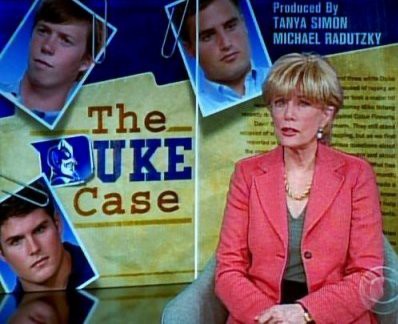
I can’t say for certain, but there is an excellent chance I have been, behind my back, erroneously labeled a lacrosstitute.
I say “lacrosstitute” because that is the epithet of choice for a girl in a sundress who, for whatever reason, chooses of her own free will to consort with a bunch of louche loudmouths in Hawaiian print board shorts and mesh practice pinnies that announce “SUNS OUT, GUNS OUT” and cover neither chest hair nor beer guts (both being marks of proud distinction among their bearers).
I can see where the confusion would lie if you knew me from like 2001–2005 though. True confession: I had friends on the lacrosse team.
You probably hate those guys. I kind of hated them too, whenever I was not busy loving them. Isn’t that kind of the way we feel about all our friends? But I loved them most of the time. Of course, I was naïve: this was before I moved to New York and became exposed to all the wildly chivalrous and unbendingly considerate flower-senders and door-holders there.
I say “erroneously labeled” because the suffix in lacrosstitute implies a certain barter system in which I took no (fine: little) part. Partially because the laxers were my friends-but mostly because I knew too much-I avoided becoming a character in their trumped up kiss-and-tells, although I’d usually hear the lurid details of their “trips to jackhammerville” the next day during a Burger King run. This was the era of the Shaq Pack, mind you, and those cheese fries were delish.
My buddies in college were funny and brash and fiercely competitive. A casual game of backyard bocce once escalated into a high stakes showdown of shouted expletives and shrieking egos (in a good way though!) and one time I picked up a remarkable amount of social currency by balancing on the back two legs of my library chair for the longest out of anyone.
A number of my friends drove Wranglers, and one of them was named Tap. (The driver of the car, not the car.) Several were man enough to be in a cappella groups. One guy had a sub named after him by a local pizza parlor. Most of them have since been laid off by investment banks.
Many of these guys were surprisingly creative but opted to use their powers for evil. A girl who always looked tanned and thin and smoking hot the first few weeks of school but lost her luster as the semester progressed was declared the “Mackinaw Peach.” I mistakenly assumed for years that the nickname “Chrome,” bestowed upon one of my classmates, had something to do with the color of her hair. I was wrong. “Her face looks like she’s missing a chromosome,” someone explained. (I have to say, he had a point.)
Only with hindsight do I see the cumulative toll that such prolonged exposure to these stories and one-offs has taken on my psyche. If this is how these guys talked about those girls, I now consider, what on earth would they have to say about me?
So when I first heard the rumblings that some laxers at Duke had assaulted a stripper, I wasn’t entirely surprised. I hadn’t heard the details, but I nodded at the timing: during spring break as the team idled, bored on an otherwise empty campus. I had heard vague stories of similar parties with similar supplemental entertainment that had taken place on my own campus and been populated by my own friends, and these vague stories had included vague details that suggested that not every person in attendance had behaved as a perfect gentleman should.
***
The Duke Lacrosse rape incident wrapped up, into one very ugly and heavy burlap package, so many of the things we know and hate from the last ten years of our lives. Race, class, sex and sports? A raging and judgmental group of academic elites? A salivating media corps? A vengeful prosecutor with suspicious political motives? All this and more.
Nine days after the exotic dancer, Crystal Mangum, went to authorities with the ever-changing details of her ordeal, 46 of 47 members of the team provided DNA swabs to authorities per a court order (the 47th, who was black, was exempted from the trip).
I imagined my own friends, in their various permutations of athletic warm-ups, filing into the police station as if it were a stadium. The whole team would have been present in that scenario: all of them were white.
NANCY GRACE: OK, wait a minute. Wait a minute. … David Foley, if they’re innocent, why not cooperate? Why stall? Why did they have to have a court order for 46 or 47 lacrosse members to give DNA? It’s very simple. You take something that looks like a Q-tip. You swab the inside of your mouth. It’s nothing more than like a doctor looking for a sore throat. Why? Why wouldn’t they give their DNA? Let’s think about it, Dave Foley! Give me your best shot.
DAVE FOLEY, DEFENSE ATTORNEY: Well, Nancy, in terms of this, we’re dealing with young people, OK, who are not necessarily familiar with the law, number one. So they need to have their legal rights…
GRACE: You’re kidding, right?
FOLEY: No, I’m not kidding.
GRACE: Because, you know, at age 17, you know where my father was? He was on a fighter ship halfway around the world, representing his country, about to die for his country. You know what? Don’t talk to me about how young they are, all right?
FOLEY: Well, they’re…
GRACE: These are the elite members…
FOLEY: … lacrosse players at Duke.
GRACE: … of the lacrosse team.
FOLEY: … But the bottom line is they’re not familiar with legal procedure, and so forth. As we know, they have to produce driver’s license, identification and so forth, but they don’t have to give statements or answer questions regarding these matters. And they could potentially be charged if they gave false information or misleading information, so…
GRACE: Well, why would they do that? Why would you go to a cop in an alleged gang rape case, say, and lie and give misleading information? I don’t know — where’s that coming from? You think they’re…
FOLEY: Because, Nancy, you’d be nervous, and some — especially when you’re dealing with people, let’s say…
GRACE: I think you’re nervous.
FOLEY: … trying to protect their friends, and so forth. So…
GRACE: You seem nervous to me. You’re nervous. And you know why? Because there’s really no good reason why, if you’re innocent, you won’t go forward and go, Hey, you want my DNA? Take it. I insist.
Nancy Grace is hardly proxy for the media at large. But the above interview took place on the very same day that the more levelheaded Times writer Selena Roberts penned her own scathing missive against the Duke lacrosse players, comparing them first to “drug dealers and gang members engaged in an anti-snitch campaign” before settling on “a group of privileged players of fine pedigree entangled in a night that threatens to belie their social standing as human beings.”
By mid-April two of these questionable human beings, Collin Finnerty and Reade Seligmann, had been picked out of a photo lineup composed entirely of members of their team-defense attorneys later likened it to “a multiple choice test with no wrong answers”-and formally charged with first-degree rape, sexual offense, and kidnapping. Not good news for their social standing! Nor was making the cover of Newsweek.
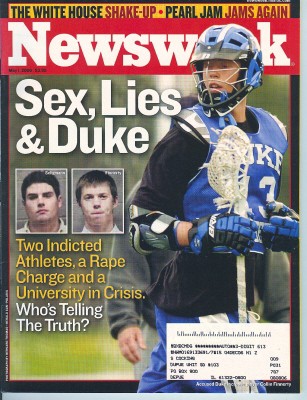
In the weeks that followed, a second round of DNA results found no conclusive matches to any of the 46 lacrosse players. (DA Mike Nifong had shrugged off the negative results of the first test: “Maybe they were wearing condoms.”) Further bolstering the defense’s case was the near minute-by-minute alibi, backed up by phone, ATM and Duke access card records, that rendered Seligmann’s involvement all but impossible. Several writers and bloggers, Brooklyn College history professor KC Johnson chief among them, began meticulously outlining the prosecution’s various inconsistencies and transgressions.
Nifong, meanwhile, won the Democratic primary for reelection and then called a press conference to announce the indictment of a third player: team captain David Evans.
***
The guys I knew actually were criminals.
The high score list on the Photo Hunt machine at our beloved local hotel bar was so hotly contested that one night my friend Nate smuggled the entire terminal out a side door and into the getaway Dodge Caravan, a hand-me-down from his mom. I knew his mother well: she appeared at every game, festooned in various regalia bearing his number, and she always set up hoagies outside the locker room and sent me home with a Gladware full of brownies.
Anyway, we no longer had to leave the lax house to play Photo Hunt after that night.
***
As with most collegiate sports, the lacrosse world is fairly small. My best friend Sarah, herself a laxer in college, had just been introduced to a “super nice” Long Island family with five children and was set to spend the summer as a nanny for the two youngest girls before she went off to med school. The family was the Finnertys, as it turned out. Collin was their middle child.
“People think that I have the toughest time,” Collin would tell a Raleigh Metro reporter, “but it’s harder for my mom. I’ll be happy to see her sitting on a beach or some place, not having to think about this. When it’s over, I’ll be happy to see my whole family relieved, but especially for my mom.”
“Dude,” exclaimed my friend Brendan over the phone after the names of the accused hit the news. “I know Reade Seligmann from Delbarton. He’s seriously the best.”
I murmured sympathetically.
“No, I’m serious,” Brendan said. “Like, genuinely the nicest dude. The nicest dude. He’s so nice he makes ME look like an asshole. And I’m not an asshole!” He paused. “Wait. Am I an asshole?”
Brendan was not an asshole; he would never hurt a fly. But he would grab pizza off a strange girl’s plate after way too many drinks, take a giant chomp, throw the remnants back down… and then smack her on the ass. I’d seen this happen more than once.
“Lacrosse players at Duke have generally excellent grades, almost always graduate and often find jobs waiting for them on Wall Street,” conceded Newsweek magazine in the “Sex, Lies and Duke” cover story. And…
But they have a reputation for swagger and rowdiness, according to The Chronicle, the student newspaper, which wrote last week, “Players frequently walk around with girls-sometimes called ‘lacrosstitutes’ by their peers-in tow,” and have been known to kick in doors and urinate out windows. History professor Peter Wood, who often has lacrosse players in his course on Native Americans (who invented the game), complained that team members sometimes signed in to class and then walked out, without bothering to sit down.
Setting aside the fact that a great many college students who have neither heard the phrase “long stick middie” nor tried to use it as an innuendo have themselves been known to kick in doors and urinate out windows and bounce from class (I’ve done at least two of the three myself, and I don’t even think I was “in tow” at the time), this characterization is, as they say, not wrong.
There’s conduct unbecoming, though, and then there’s allegations of violent, strangling, 30-minute gang rape perpetrated by as few as two and as many as 20 members of a team, depending on when you asked.
A year after the first indictments were handed down, North Carolina Attorney General Roy Cooper, calling Nifong a “rogue prosecutor,” dropped all charges against Finnerty, Seligmann and Evans. “We believe that these cases were the result of a tragic rush to accuse and a failure to verify serious allegations,” Cooper said. “And in the rush to condemn, a community and a state lost the ability to see clearly.”
In June of 2007, Seligmann was one of several people who testified at the formal ethics hearing that would ultimately lead to the disbarment of Mike Nifong. Voice breaking, he described the moment (at the 4:40 mark) that he learned he’d been identified by the accuser.
“The first thing I thought about was, you know… how am I going to tell my mom?”
Katie Bakes writes on the Internet.
The End of the 00s: Buffy, Season Five, Episode 22, 'The Gift', by Dan Kois
by The End of the 00s
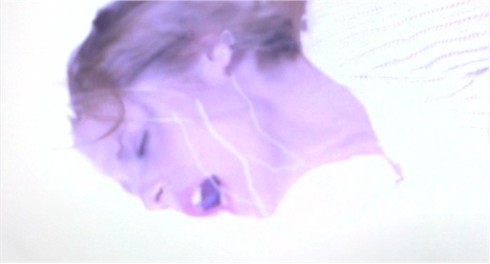
It was the spring of 2001. I lived in Honolulu, in a house high in the mountains. From our front yard you could see all the way from (gesture) Diamond Head to (gesture) Pearl Harbor. I telecommuted to the DC literary agency that had employed me through grad school, starting work at seven in the morning and kicking off most afternoons around two, when everyone on the East Coast had gone home. We had gotten a puppy at the Honolulu Humane Society, a test case for children one day: If we could keep her alive, perhaps we would do the same with kids. So far she had chewed through her rope and escaped a dozen times; smashed geckos flat with her paws; torn the upholstery off our couch in great strips; consumed a pair of eyeglasses and a roach motel. She was still alive. That was the year that I watched so much Buffy, and the season-five finale, “The Gift,” was the ecstatic peak of my fandom.
“The Gift” isn’t the best episode of Buffy the Vampire Slayer ever. It’s maybe in the top 20. It’s not the best season finale (that’s “Graduation Day,” I’m pretty sure) or even the best episode in its season (that’s “The Body,” obviously). But living as we were in a fever pitch of Buffy obsession, the season finale seemed enormous.
The show was about to move from The WB to UPN, a move that presaged the network-defections of other great (and not-so-great) shows later in the decade, from Project Runway to Scrubs. These days, if you happen to be a fan of Scrubs, its switch to ABC has relatively little effect on you: Your DVR will find it just fine, and life will continue on its merry way. But back in 2001 the network change-and the threat of series cancellation under which it happened-were huge. Plus, it seemed like Buffy was maybe gonna die.
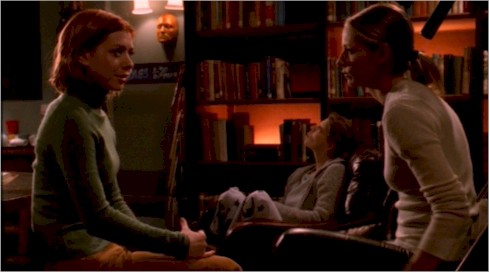
It had all happened very fast. My wife had been watching Buffy for a while, and it had become one of those Shows You Should Watch-friends and neighbors and friggin’ Entertainment Weekly couldn’t shut up about how great it was. I watched the season-five premiere, and before I could even catch my breath, I was watching every week and reading Ace and Sep’s recaps and buying videotapes by the score so we could record the previous four seasons-not yet out on DVD-as they aired in sequence on FX. (One episode in the morning, another at night. You could fit six on a tape in SLP. It was the first and only time I learned to program a VCR.)
God help me, I gave my wife the Buffy board game for Christmas. Her brother landed in Hawai’i in the spring after a post-collegiate Asia tour and crashed on our couch for months; he and I watched recorded Buffy episodes every afternoon.
What was it that was going on in Season Five? Even having just rewatched “The Gift,” I can’t quite remember it all. There was a thing with some monks, and Dawn was the Key, and Glory and Ben, and “Death is your gift,” but the details are foggy. No matter. There is lot that is terrific about “The Gift”: Buffy’s threat to kill anyone who goes near Dawn (“Not exactly the St. Crispin’s Day speech, was it?” Giles asks tartly); Tara’s return to Willow; Spike being allowed back in Buffy’s house; the cheesy-looking dragon on which the show clearly spent its entire effects budget; Giles saying, quietly, “She’s a hero, you see. She’s not like us”; Buffy’s final sacrifice. Her gravestone, you may recall, captures the mix of melodrama and irreverence in which the series, at its best, specialized.
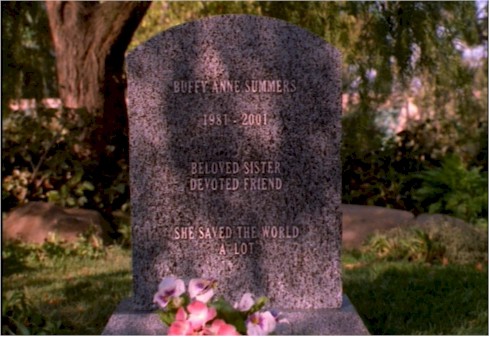
As it turned out, the episode was the beginning of the end for the series. Seasons Six and Seven deteriorated in quality, yielding just one great episode (the musical, duh) and a lot of irritating narrative cul-de-sacs. Buffy never again attained the heights of cultural relevance it had at that moment, and Joss Whedon-despite a decade spent creating much-loved cult objects like Angel, Firefly and Serenity, Dr. Horrible, Dollhouse -is further from stardom now than he was that night in 2001. The series came out on DVD and we bought all seven seasons; skipping through DVD menus was much easier than fast-forwarding through a six-episode videotape, so needless to say we watched Buffy much less.
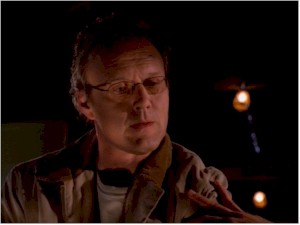
We moved to New York. I escaped careers for which I was unsuited and got jobs writing about culture, even as my energy for keeping up with culture flagged. We had two wonderful daughters and moved to the suburbs. (Our dog remains alive.) Now I listen to “Let It Be” and Dan Zanes over and over, but have no idea what Wavves sound like. Yes, I lined up for Lord of the Rings tickets and obsessively analyzed The Wire. Yes, I sent my daughter to her grandparents’ for the weekend so I could read the final Harry Potter book uninterrupted by actual children. But never again would a cultural artifact make me feel the way I did on May 22, 2001.
I’d spent all day avoiding spoilers on the Internet-infuriatingly, people on the East Coast would learn Buffy’s fate six hours before I did-and calling my wife on the phone to ask her what she thought would happen. That night, as we settled down on the ripped and tattered couch with my brother-in-law and our still-alive dog, I felt a great and awful excitement, like a child’s unbearable anticipation on Christmas morning. To this day I have never felt anything like it. There was this thing, this story, and I wanted it so much, yet I didn’t want it to end, and I didn’t want to be disappointed, and I was terrified and thrilled at the same time. I had invested 99 hours of my life in watching this show, and countless more talking about it, thinking about it, reading about it, and it was all leading up to this. My stomach hurt.
If you watch “The Gift” on DVD, it starts with, you know, the pre-credits teaser, where Buffy saves a guy in an alley. But that night, as the episode aired, it started, as episodes always did, with Giles’s familiar voice saying “Previously, on Buffy.” And then the next thing happened, and I lost my shit.
Dan Kois writes about movies and plays and non-comic books, too. Also, he has a book coming out, about that Hawaiian guy with the ukulele. For the love of God, please consider buying it.
A Very Christmas Listicle Without Commentary: The Best 85 Words Ending In -icle, In Order
by Ned Frey
85. listicle
84. cubicle
83. charticle
82. bernicle
81. funicle
80. reticle
79. appendicle
78. cornicle
77. follicle
76. caulicle
75. bursicle
74. article
73. fairnyticle
72. sicle
71. conventicle
70. radicle
69. lenticle
68. isicle
67. fascicle
66. fairniticle
65. disconventicle
64. adminicle
63. fernyticle
62. fernticle
61. pedicle
60. curricle
59. ridicle
58. verticle
57. sanicle
56. auricle
55. cuticle
54. vernicle
53. particle
52. versicle
51. caudicle
50. thesicle
49. pneumoventricle
48. panicle
47. infraclavicle
46. silicle
45. pannicle
44. calicle
43. ferniticle
42. proventricle
41. monticle
40. clavicle
39. perpendicle
38. pendicle
37. sphericle
36. tunicle
35. subarticle
34. ossicle
33. cicatricle
32. microparticle
31. rusticle
30. interparticle
29. spiricle
28. denticle
27. utricle
26. postclavicle
25. chronicle
24. pellicle
23. cementicle
22. vesicle
21. orbicle
20. microvesicle
19. ventricle
18. interclavicle
17. antiparticle
16. vitellicle
15. multiparticle
14. wavicle
13. planticle
12. vehicle
11. bipedicle
10. quasiparticle
9. epicuticle
8. papulovesicle
7. pseudoventricle
6. icicle
5. canticle
4. testicle
3. supraclavicle
2. chicle
1. popsicle
Ned Frey is a corporate writer who pens occasional reality show linkbait posts for Gawker as “MisterHippity.”
The End of the 00s: The Hunt for lonelygirl15, by Richard Rushfield
by The End of the 00s

In 2006, as a reporter for a major metropolitan newspaper, I joined in what was at that time the largest manhunt in human history: the search for lonelygirl15.
At the time, all the world knew about this shadowy underworld figure was that she claimed to be a teenage girl shooting videos of herself on a webcam from her teenage bedroom somewhere in the great sprawl of America. As the world became entranced by the beguiling and wise innocence of her two-minute films, the demand grew to a ferocious roar for the young star to step forward and accept all the honors that a celebrity-driven society could bestow on an instant sensation. And when Bree, aka lonelygirl, failed to materialize, the suspicion arose that perhaps this was some sort of fraud-that the world was being put on.
Was lonelygirl a publicity stunt for an upcoming movie, or some kind of product tie-in? The videos alluded to a strange religion to which Bree and her family belonged; could she be a tool for brainwashing to a sinister cult? Or were these tapes from beyond the grave? A child slavery ring? A high school theater project? All these possibilities seemed probable as the hunt for lonelygirl suddenly ignited and captured the attention of the world’s most accomplished detectives, including me.
For weeks, I spent nights up until dawn searching for the truth of lonelygirl. I combed message boards looking for clues, hacked into disabled MySpace accounts of alleged friends, attended concerts of bands favored by Bree, had late-night secret meetings at Hamburger Hamlets with mysterious informants. I begged Australian high schools to FedEx me copies of old yearbooks.
My office walls were covered with charts and evidence sheets, attempting to triangulate the mysterious lonelygirl. As the great newspapers and media outlets of the world turned their cannons on the hunt, it seemed impossible that no one had seen this girl ever. Was she a computer generated hologram? Was she being stowed in a safe house in darkest Tibet? The longer the hunt went on, the greater grew the sense that this was just not possible-and somewhere there was a portal behind which were stored the mysteries of the universe and we were all just walking right past it.
In the end, working with a team of heroic researchers who came together online, we cracked the case and I was able to bring lonelygirl to justice. Through a painstaking sting operation, we were able to establish a connection between lonelygirl and the world’s premiere talent agency, proving that Bree was in fact a fictional creation. After a long, grueling hunt, I found myself early one morning sitting across a conference table from Jessica Lee Rose, the brilliant young actress who portrayed Bree in the series.
At that pre-dawn meeting, followed by a round of interviews with dozens of reporters from around the world, it became very clear that what lay ahead of us all was one of the most confused, misguided-one might even say retarded-chapters of human history. The internet age had brought forth episodes of buffoonery the likes of which our forefathers could only have dreamed.
Only now, as the decade draws to a close and this new media age really just takes off, can the full lessons of The Hunt for Lonelygirl begin to be understood. Here, years later, is what we can take away:
§ Nothing will ever again be too trivial: I spent months trying to unearth the truth of a girl talking into a webcam about the guy at school who liked her but with whom she just wanted to be friends. So did the great media outlets of the world. And when the truth was uncovered, it was on the cover of every paper everywhere.
§ Hysteria will ever lay in wait: Once a few people started getting excited about this mystery online, like a flash mob, like h1n1, the frenzy spread and we were powerless not to join in. With all of us glued to the web, habitually scanning and refreshing in search of the news, diversion and novelty, there is no defense against a good ridiculous insane mystery. The road to balloon boy was very short from that point.
§ The wisdom of the web is a bunch of hooey: The lonelygirl research teams drew professionals from every discipline and field of study known to man, who pooled their talents to crowdsource the hunt. Horticulturists examined the flora dotting some videos and pronounced it native to only a very tiny part of Northern California. Crews from major Hollywood productions drew graphs proving that the lighting on the videos had to be a very expensive, complex set-up only available to professional crews. When I met Jessica and the lonelygirl team, they told me that the lighting in the video had consisted of a desk lamp, turned in different directions and also sometimes they opened a window. And they had never shot anywhere near Northern California. The Web, simply put, is a humongous moron.
§ No one is actually listening anymore: One of the great frustrations of the lonelygirl hunt was the fact that, despite having her face plastered everywhere in media, for weeks and weeks no clue about her identity emerged. How was this possible that no one had seen her? Well, it was possible because, despite everyone on earth in one way or another seeing her face (certainly everyone who used the internet), no one was actually paying attention. It was presumed by detectives on the case that if Bree was a fake, she must have been recruited in some distant land and kept locked away in a safe house. In fact, she lived near Hollywood and was an active aspiring actress, with headshots, acting classes and all kinds of industry acquaintances. She had worked in the make-up department of King Kong, for crying out loud. When I met Jessica, I asked her if, instead of doing all the charts and hacking if I had just sat at the Coffee Bean and Tea Leaf on Sunset Boulevard (the latte grounds of young Hollywood) for a couple weeks, would I have seen her there? She admitted I would have. She was right under the nose of the media but no one had put it together, or been thinking, or paying attention….
History will long remember the astonishing work my peers and I did during those historic weeks. Cracking the case of the lonelygirl remains the finest hour of post-modern journalism, and Jessica herself now belongs to history. But despite the glory that this adventure bestowed on all involved, the knowledge that it ushered in an extremely spazzy age will forever haunt all those whose lives it touched.
Richard Rushfield is the author of ‘Don’t Follow Me, I’m Lost: A Memoir of Hampshire College in the Twilight of the 80’s.’
The End of the 00s: The Dance-Off Decade, by Lindsay Robertson
by The End of the 00s
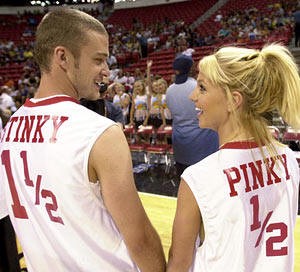
In the wee hours of August 1, 2002, Britney Spears and Justin Timberlake, who had broken up the previous March after Britney allegedly cheated on Justin with their shared choreographer, ran into each other at a club in Los Angeles called The Lounge. Reports differ, but by all accounts the two young pop stars began arguing, with Britney complaining that Justin had been “using different women for media attention” and Justin calling Britney a cheater. The arguing got heated, and continued onto the dance floor of the club — where for the next 90 minutes, Britney and Justin, with the help of their respective entourages, reportedly had a dance-off.
While the significance of the Spears/Timberlake dance-off was not lost on the gossip-reading public (it made the cover of US Weekly) — or even SNL, which re-enacted the event (rather lamely) during actor Matt Damon’s monologue a few weeks later (Amy Poehler played Britney) — the public soon forgot about the incident as both Britney and Justin began to morph from bubble gum pop singers into international superstars.
Both would go on to write songs about their breakup — Justin released “Cry Me a River,” and its subsequent video starring a cheating Britney lookalike, and Britney returned with “Everytime,” which ended with the haunting line “My weakness caused you pain, and this song’s my sorry.” Yet so many questions still surround the dance-off: not just the obvious and, it seems, unknowable (who won? what moves were used?) but also “How does the Spears/Timberlake dance-off define an entire decade?” Because it does. It really, really does.
Much has been written about how reality TV and the sudden easy availability of fame have made this decade what it was. And of course it’s true: this was the decade when any old regular person could get famous, as long as he or she wasn’t choosy about what they were famous for. Some, like Paris and Nicky Hilton, enjoyed fame before they literally ever participated in or created a product of any kind — remember when every writer smugly called them “famous for being famous” and thought he or she was the first one to think of that clever distinction? And remember when it was actually a kind of awe-inspiring observation? This was indisputably the decade in which everyone asked everyone else to come into their lives and look at them and know who they were. If the 70s were “The Me Decade,” the 00s were “The Look at Me Decade” (Or, possibly, the decade in which we all realized every decade, for all eternity, would be “The Me Decade.”)
Anyway, the dance-off. By the time the dance-off occurred, we already had Survivor and Big Brother (remember how long they waited to tell the Big Brother contestants about 9/11 because giving them news of any kind broke the rules of the gameshow? And doesn’t that seem so weird now?) and of course we’d had The Real World forever already. We were already, as a culture, eagerly watching regular people with no talents do nothing on TV.
But the dance-off, and the subsequent respective revenge/apology songs represented the flip side of what was going on in the culture. While all around them, regular ugly people who had not spent their entire childhoods honing their performance and entertainment skills were getting nearly as famous as they were just for eating bugs or whatever, Britney and Justin probably felt a little confused, and no doubt a bit resentful. Maybe they wondered if they were the last of a dying breed. Maybe they feared that they needed each other to survive (and, indeed, they would). Maybe it was fate that brought them together at The Lounge.
So when these two trained entertainers collided at that Los Angeles club that night, they didn’t just argue the way regular old ugly people would argue. No, Britney and Justin resolved their differences the only way those two child performers knew how: they got out on that dance floor and they danced.it.off.
And then, possibly mutually inspired, they staged another “dance-off” in the public stage with their song releases, making millions of dollars and changing their images forever in the process. The Spears/Timberlake dance-off was one of the moments in this decade when the talented asserted their superiority and claimed a little bit of their own space back from the encroaching hordes. The Spears/Timberlake dance-off was a signal to the bug-eaters that there’s a little tiny thing called talent that should still be part of the conversation. After the dance-off, reality TV went through all of the often ugly mutations (remember Temptation Island?) it had to go through to get us to where we are now, in a TV landscape that is once again at least partly talent-based (Top Chef, Project Runway, So You Think You Can Dance, American Idol) with a little bit of cray-cray thrown in just so we don’t get to cocky about our high culture (one word: Hoarders).
I’d like to think that what happened on that sultry August night in that Los Angeles club was one of the milestones on the twisted and gnarled path that was the Aughts, and one of the moments that helped keep the old value of true showmanship alive in our culture. But probably not. US Weekly probably made the whole thing up.
Lindsay Robertson has been meta-enabling on the internet since 2000.
The End of the 00s: Top 10 Jobs I Lost This Decade: Failing Up, Sometimes, but Mostly Sideways, by...
The End of the 00s: Top 10 Jobs I Lost This Decade: Failing Up, Sometimes, but Mostly Sideways, by Jackson West
by The End of the 00s

I’ve been looking for, finding and losing jobs since I was 14, the legal working age in Washington State. The first job I was fired from, after just a couple of months, was a filing job at a pool equipment supply company in Seattle. I did get former Supersonics All-Star power forward Shawn Kemp’s old home address out of the deal, so that’s something. But that was the dawn of the 90s, and while I’m sure I gained and lost at least ten more jobs in that decade, I’m pretty sure it couldn’t compare to the volatile 00s. I wasn’t always fired, mind you-straight-up firings, lifetime, I can count on one hand. No, these days things are much more passive-aggressive. Generally the work was temporary from the get-go, or else I was downsized, and sometimes I even quit or transitioned to part-time on relatively good terms. I, like most Americans, have been fully widgetized. The concept of job security is a sort of mythical legend from a pre-historic dreamtime.
The new narrative, I’m told, is that with hard work and good ideas, you’ll hop ever higher, each time finding new and better opportunities-your employer is no longer burdened with the expensive responsibility of cultivating your loyalty, skills or health. But I grew up in the Pacific Northwest, where even successful entrepreneurs like fried clam tycoon Ivar Haglund celebrated the endemic lack of ambition amongst the populace in commercial jingles, and frankly I would be happy just to get by doing something that doesn’t bore me beyond hope.
In the last decade, I’ve weathered two full cycles of the San Francisco Bay Area’s hyper-volatile brand of Gold Rush capitalism. Granted, I have rarely made the best personal decisions-private art school in New York, for starters. Binge-cycle polydrug abuse. Making the move from web production and technical writing into, idiot that I am, creating “content” for online publishers. But I’ve seen people do far less advisable things and succeed anyway. Seems to have something to do with the Ivy League, family wealth or, failing those, an Oprah-bait memoir. So while I’d so very much like to blame myself, I can’t entirely discount macroeconomic machinations, otherwise known as The Man, and in all his terrible manifestations.
I’m currently living in a residential hotel while filing local news part-time for a major national media conglomerate (for little remuneration) and a minor local media startup (for no remuneration), while considering substitute teaching, cab driving, or both, as a sideline-so I’m well on my way to losing even more jobs in the teens! But this isn’t about my giddy optimism for future sad material, this is a lowlight reel of mistakes already lived, in roughly chronological order.
* * *
§ Shockwave: My first gig was at Wine Shopper, where I edited HTML (in Homesite, on a Pentium desktop with a CRT display- those were the days) for a couple of weeks, making twice what I was making as an administrative temp on the bond floor of J.P. Morgan’s Wall Street office the previous year in New York. I had lunch in South Park and went to my first party at 111 Minna. Then I got not one, but two temp offers through my agency-and even though it didn’t pay quite as well, decided to go with Shockwave because it sounded more fun and promised to take better advantage of my wildly expensive NYU Tisch education.
Shockwave, named after the browser plugin, had every dot-com cliché down pat, from the video game room to the free, catered lunches every day and the Friday beer bash. The creator of early hit Radiskull and Devil Doll walked around the office with sunglasses on, pretending to be a rock star but was more likely hungover. People complained about the lack of variety while standing in line for the free, catered sandwiches and salads served for lunch. I spent most of the day playing Shockwave Golf and wishing I could leave early to garden my sunny backyard plot of dirt in Oakland and drink beer. I lasted about four months. Not long after, the free lunches were history, layoffs commenced and eventually the company was purchased by Atom Films.
§ Macromedia: Surprisingly enough I ended up with a job at Macromedia, the company that spun Shockwave off as a content portal, after working for a couple of other SOMA and Mission startups with payrolls bloated by easy venture capital and the “go big or get out” ethos of the time. I produced the Macromedia EDGE email newsletter for the marketing department, and took full advantage of broadband and the company’s dedicated servers for MP3 storage to raid Napster. I seem to remember showing up at work high on ecstasy once. It was not an ecstatic experience. I also remember sending a wildly political response to a wildly political company-wide email thread. Something about the Taliban in Afghanistan if I recall. Jesus, that was stupid.
I got let go shortly after accidentally releasing the email code for delivery without confirming with the server administrator who had the keys to FTP access for uploading images but who was always frustratingly difficult to find. It was, ultimately, my mistake, and I wasn’t even drunk or high at the time. (Though I’ve since learned that my laziness needs no lubrication.) It was a long way from the BART station anyway. And did I mention I had a garden?
§ Sonic Solutions At this point, the bottom was falling out from under almost everything. But I managed to find some freelance work here and there-developing a custom, automated online radio Web site for a New York trance DJ, writing articles about Flash production for CNet Builder, and developing interactive tutorials for Sonic Solutions’ line of DVD authoring software.
Then my editor at CNet was laid off, music publishers essentially shut down the online radio station, and accidentally including the email of my contact at Sonic Solutions in regular CC, not a blind CC, for a holiday email blast pissed him off something fierce. So no more work to return to at that well. At least it convinced me never to send a holiday email blast again. I did rather enjoy blowing over $1,000 of my last invoice winnings on a long weekend in New Orleans at a bachelor party held in October of 2001 (the bachelor, who was living in Vermont at the time, was too nervous to travel, but the rest of us went anyway out of patriotic duty or something). So at least I got to see Nola before the flood.
§ Hewlett-Packard: This gig actually went pretty well, for the most part. I only reeked of ganja occasionally when carpooling to Sunnyvale with an integrated circuit designer from Berkeley in the morning. I was translating human resources department documents from Word, destined for print, to HTML destined for the company’s intranet. It was easy work that I quickly automated, leaving me more time to research vacuum tube electronics and take long lunches, eating at the nearby North Indian buffet and browsing the aisles at Halsted, a magical shop stuffed to the ceiling with recycled electronics components.
Considering my nightly drinking and smoking, I didn’t do a terrible job. But eventually they brought someone younger, cheaper and more earnest in, had me train him, and let me go. It was my first job in the Valley proper, and the long commute and creepy, pedestrian-free office parks where my only encounters with fellow animal life were feral cats and leafblowing groundskeepers pretty much convinced me never to do it again.
§ Premier Retail Networks: I just mention this one because you should know that there is a company, one that actually hires a lot of actual artists, to produce content for the television channel that plays in all Wal-Marts, as well as some other big box chain stores. The gig only lasted a couple of weeks-they wanted someone with a childlike illustration style (though I never did take that class taught by John Canemaker) for storyboard pitches in some synergy campaign involving Coca-Cola and Harry Potter, so that kids who might actually be reading could have their emotional attachment to literature and film leveraged for brand loyalty and their metabolisms hooked on high-fructose corn syrup. So that’s how that sausage is made.
Little did I know that it foreshadowed my future of desperately hoping for disposable, low wage media work with no benefits, a labor situation that would make the dessicated corpse of Sam Walton shed a single maggot tear of victorious joy.
§ Osborne McGraw-Hill, Pearson: At some point, out of the blue, a literary agent of sorts called from San Diego. Who knows where he got my name-a CNet byline? My mom?-but he was looking for a writer to finish a book on Final Cut Pro 2 that had been abandoned unfinished by its author in Tennessee. $4,500 for four chapters, probably fifty cents a word in all. Then he wrangled a deal for me to write my own book-feel free to look it up on Amazon, but don’t buy it, it’s terrible-which I then also abandoned 17 chapters in.
I saw $6,500 of the $9,000 advance, and had to pull teeth at that to get payments even after fulfilling the staggered copy quotas-and for the amount of copy, illustration and example graphics, well, it was a less than minimum wage job. Depressed and resentful, I played Civilization III and day-drank my relationship into the ground. But at least I learned first-hand what a racket the technical publishing world is, and the break-up did leave me free to finally get the hell out of Oakland and move across the Bay Bridge.
§ Williams-Sonoma: Here’s the thing. I actually can put up with bullshit, soul-sucking jobs for quite a while. (About six to nine months.) Unfortunately, Williams-Sonoma made the mistake of turning me from a permalance Pinocchio into a real, live employee managing graphics and copy on the Pottery Barn Teen Web site right at the nine month mark. It was all downhill from there. At this point, it was probably pretty clear I was a candidate for an Employee Assistance Program, but the only interaction I had with Human Resources was when they asked me to sign away any rights in exchange for a modest check after not classifying me properly under state labor laws so they could stiff me on overtime.
Yet the real point when I realized that I didn’t give a fuck if I kept this job or not was after being invited to one of the monthly meetings where we processed mail from fans of the Pottery Barn Teen catalogue. The letters, all from young women (“Teen” enjoyed the wealthiest demographics of Williams-Sonoma’s stable of brands, because who the hell spends hundreds or thousands on a bedroom set for a kid that’s off to a dorm room in a few years?) who unanimously referred to the catalog as a “magazine.” This was seen as a business victory, and my ethical qualms over the manipulation of media literacy the company indulged in just earned me glares.
Another time, canoeing on the Russian River with friends and tripping on psilocybin, an Ivy Leaguer employed by the local non-profit-industrial complex harshed all over my buzz by pointing out the realities of the trade in luxury housewares imported from sweatshops worldwide. Yes, she was and is right, but I hope she’s never bought anything at IKEA, and of course, easy for the pedigreed class to get on my case for having a fucking job. I should know, I do it to other people all the time.
§ SFist: What did I do all day, hungover at work, that contributed to my inevitable firing at that job? Browsed blogs, started writing my own, and eventually signed up as the editor for the San Francisco colony in the Gothamist empire. It was fun! I got to work with great people! It didn’t pay! And my manager at Williams-Sonoma was probably getting reports on my Web browsing from the IT department! Not that my job was any great loss from a career development standpoint. Mostly it just meant that, at least once the Employment Development Department figured out that I was fired for cause, I didn’t really have a way to pay the rent or buy food.
Of course, another nine months or so later I managed to end up getting fired from that job. (A koan: if you’re fired from a job that doesn’t pay, is it really a job?) Between staff discontent, a few missed posts, and my pleas to the publisher for help with my rent (when I should have been asking for equity) I managed to go from “editor” to “editor-at-large” in a couple of tear- and vodka-streaked phone calls. Good times. I actually remember them fondly. Because it was probably the first time I actually cared enough about my work to cry.
§ Yahoo: I did manage to keep myself afloat for a couple of months at SFist with a gig blurbing news stories for the Yahoo landing pages that were automatically set as your homepage in Internet Explorer when you made the mistake of actually installing the software on the CD-ROM that came with your SBC or Rogers DSL account. The work was largely unremarkable, and my performance largely lacking, except for one incident.
We were asked to choose the types of stories that make the “most emailed” list on Yahoo News, which heavily emphasizes the “weird and wacky.” So some hippies in Spain decided to take off all their clothes and ride around on bicycles in a “weird and wacky” protest of the environmental and social impact of the international oil trade. I duly blurbed the headline and synopsis, and cropped a picture of a crowd scene (shot from the side) of nude cyclists down to a thumbnail that measured around 64 pixels. Maybe, if you squinted through a magnifying glass, you might have been able to register four square blocks representing a man’s naked haunch or the side of a boob.
This not only got me reprimanded (“we can’t give users any reason to remove the news widget from their homepage”), but was cause for an email to go out through what I think was the entire news division-no nudity, ever. This was an abject lesson in catering to the lowest common denominator, by which I mean the easily offended in the suburbs and flyover states not computer savvy enough to have never installed the crappy ISP-branded, lead-generating Yahoo landing page in the first place.
§ Gawker Media (Thrice!): Naturally, and thanks to the intervention of a friend, I next ended up at Fleshbot. And while I still like the former editor as a person (I subscribe to his Tumblr!), let’s just say that he served to teach me that a good personal relationship is not necessarily a good indicator of a good professional relationship, at least when it comes to writers and editors. Besides the fact that I was still getting consequences-drunk, had little institutional memory related to the site or the subject matter, I managed to keep that going for a few months. Until I drunkenly posted a roundup of photospreads of naked girls that wasn’t up to standards, woke up hungover to an angry email and assumed I was fired. But! Apparently I wasn’t fired. And so went the first round of my on-again, off-again relationship with Gawker Media.
A couple years later, after rehab, a stint in the online tech trades at Giga Omnimedia and a four month stay in New York to finally complete my BFA in film and video production (so that I could go to grad school during the inevitable dot-bomb 2.0 I could see coming from my work in said tech trades), I ended back at Gawker Media, this time with Valleywag. Which, honestly, was a lot of fun, even if every morning I woke up in a cold sweat feeling two posts behind schedule.
My colleagues were smart and capable, the subject matter was interesting to me and a few others of a highly desirable demographic, and we seemed to benefit from a certain publisher’s apparent disdain for the blue-sky optimism of Silicon Valley’s entrepreneur fetishists and the venture capitalists that encouraged them with real American dollars. (The feeling, naturally, was mutual-Gawker Media being disdained as “a lifestyle business.”) I was happy to play the role of “token socialist,” and tried to focus more on institutional analysis than personalities, but while I generally met my ever-inflating pageview quotas, it all came to an inglorious end. My name made all the various too-insidery reports of staff being cast to the four winds, meaning for the first time I wasn’t just laid off, but laid off in public.
To be fair, an arrangement was made for me to take a stab contributing to Lifehacker and work with people I’d long admired. But for whatever reason (tone? quotas? shirking? something I said in Campfire?) that was shortly over, as well, though at least this time I got a nice call from the publisher and my name managed to stay off of MediaBistro, so thank goodness for small favors.
* * *
So there you go: from drunk to just stupid, how I went from quietly losing boring, if decently paid, technology jobs to losing fun, but poorly paid, journalism jobs. I’ve actually been at my current, aggressively part-time job since February, meaning by early next year I will have at least held on to that for an entire year. It pays for shit, but I qualify for affordable, city-subsidized health care-the first time I’ve had coverage at all except for the brief stints as a real employee at Williams-Sonoma and as a returning student at NYU.
And I have time to date and work on a screenplay and play video games and contribute pro bono to publications that I adore in the hopes that they become wild successes and reward me for my early support and generosity of time. Because, obviously, that’s worked so well for me in the past.
Jackson West isn’t angry, though maybe a bit bemused, and frankly thanks everyone alluded to but not named here for ever having put up with him for as long as they did.
The End of the 00s: The Stupid Kids of 1999, By Will Leitch
by The End of the 00s
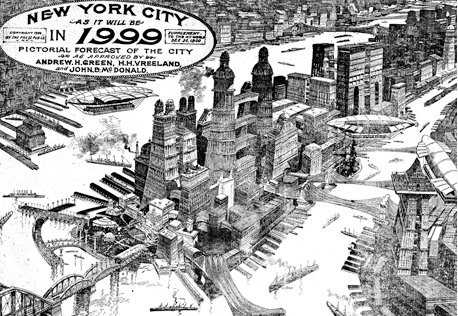
In January 2000, the world was conquerable. New York City was cleaner, crime was down, Disney was taking up half of Times Square and you could buy a pack of cigarettes for three bucks. There were jobs everywhere, and it felt like the city was an infinite playground. It was what brought me here. It’s what brought thousands of us. It’s difficult to comprehend now, and you probably won’t even believe me when I say it, but the dot-com boom that led to the influx of stupid young things into New York City was not, inherently, about money.
Sure, money was wherever you looked-Kurt Andersen famously said raising capital during the boom was “easier than getting laid in the 60s”-but money never quite seemed the point. We came to New York City not because we wanted to get rich, at least not most of us: We came here because this was where you could do whatever you want and be paid for it. It was more altruistic-thus, dumber-than capitalistic. I wanted to be a film critic, and an investigative journalist, and a Web pioneer, and a serious novelist. I didn’t have to choose. I could be all of them. I was the future. We all were. New York City was our Eden, our Utopia, our promised land. It was easy, sure, easier than it should have been, but we never thought of it that way. We thought the world was on the cusp of something important and lasting, and that we were just lucky to be alive at this point in human history. We weren’t overly optimistic or greedy or gluttonous. We just felt this was our time. We were honored the fates had chosen to give us, of all people, the opportunity. We could do whatever we wanted. We could invent our own life.
It didn’t last long, and of course it couldn’t. After the collapse-the first one, the first of many-we were listless, lost. It happened quicker that anyone could have anticipated. One day, a co-worker of mine, a friend of mine (because then all co-workers were your friends), and I were ignoring the office HR person who wanted to talk to us about the matching 401(k) plan Novix Media offered, knowing we never had to worry about retirement, or investment, or the future. A week later, our company imploded and we were drinking whiskey straight from the bottle in front of that same HR person during our exit interview. (I gave her a swig. She took it.) It seems like we were assholes now, and I suppose we probably were, but it didn’t feel that way then. It just felt like if we all worked our asses off, it was destined that we would succeed. The universe felt just.
Two months later, I was writing wildly unprofessional tell-alls about my dot-com and answering phones for Telemundo for temp work. We all deserved it, obviously. It was never supposed to be that easy. New York is supposed to be hard. I moved to New York City on January 8, 2000, with a center part, a suitcase full of Woody Allen movie posters, about 10 pounds less weight and a cat. I had never even visited New York City until I moved here. The story of this decade, for me, is the story of my decade in New York City. In this, I am not alone.
What’s funny, though, and what’s important, is that we stayed. We are the detritus of the dot-com age. We fought through it and came out stronger, or at least still alive. In my 10 years in New York City, I have held eight full-time jobs, lived in 12 different apartments (in 10 different neighborhoods, with 15 different roommates) and met and lost hundreds of people. It was a desperate lurch from one period of stasis to another, over and over, 20something Frogger morphing into 30something Sims. Like everybody else, I didn’t know what I was doing. I just knew what I wanted to do. Someday. I think we’re all still kind of like that.
See, though: That on-rush of talented, ambitious young people during the dot-com boom, they’re still here, and they laid the foundation for what you see today, the Gawkers, the Awls, everything that is great and terrible about this strange planet we find ourselves bewildered and enthralled by. This decade has been our decade, the decade in which we came out here to take over the world, were smacked rudely back into our proper station, and then regrouped for the long, slow crawl back up. Some of us made it. Some of us didn’t. But that itch, that reason we leaped into the abyss in the first place, is still there. It’s in everything you read.
There is a perception that this odd colony of bloggers and journalists and blogger-journalists and journalist-bloggers is cynical, that it is jaded, that it only wants to tear down and carp. This is the literal opposite of the truth. Those that are left, those who learned and adapted and kept trudging forward, they are the dreamers-they are, at heart, the most painfully earnest people you could ever meet. That spirit, in my opinion, is perhaps best exemplified by this very site, the one you’re reading. It would have been easy to quit, to knock this shit off, to start getting serious. Instead: There was this, a daily prance through the sad and the beautiful, the ridiculous and the divine, the Philistine and the transcendent. I see The Awl and I see those stupid 1999 kids, hoping to elbow their way toward a spot at the table before realizing, fuck it, let’s just build our own table. It means it’s still out there. It means people are still trying. It’s worth hanging on to. It always was.
Will Leitch is a contributing editor at New York magazine and the founder of Deadspin. He is the author of four books, including the upcoming Are We Winning?, to be released by Hyperion in May 2010.
The End of the 00s: The Decade In "Netflix Instant Watch," by Alex Pareene
by The End of the 00s
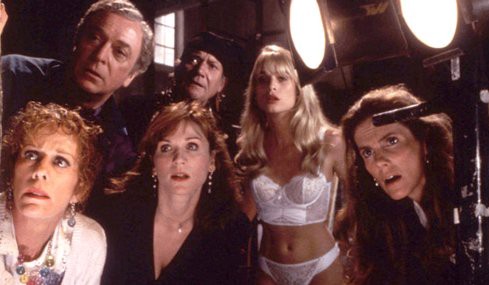
These are all of the things I have watched on the Netflix Instant Watch in this decade, in chronological order.
Let the Right One In
This was good! I liked this. The American version will be terrible. It is set in Littleton, right? UGH. So dumb.
Some 30 Rock Episodes
I didn’t watch this when it first came on, so the first season was very eye-opening! Specifically because of characters and competent plotting! They kinda jumped from “Simpsons Season 2 or 3” to “Simpsons Season 11” in the course of literally two seasons. Also: Josh! There was funny stuff to be done with this character, why did you stop?
Bottle Rocket
Holds up. So good.
National Treasure: Book of Secrets
Better than the first one, def (though I watched the first one on basic cable, so commercials might’ve ruined the meticulous plotting). The “Sneaking into Buckingham Palace” scene was successfully intentionally amusing!
Some Monty Python episodes
These are just, like, comfort food, now, which is actually kinda weird and missing the point, when you think about it.
Spies Like Us
Comedies used to be paced so differently! But Landis is basically one of the finest American directors alive and his ten-year “Animal House” to “Coming to America” stretch is unfuckwithable (though yeah that era’s Lampoon boomer asshole attitude and ’60s worship/contempt can be incredibly off-putting and unpleasant and it’s all very Reagany). Chevy Chase’s jerk routine has aged much better than Ackroyd’s nerd, though Ackroyd is inarguably a finer comedian, in terms of craft.
Batman Returns
The best Batman movie and probably my favorite superhero movie. The climax is actually genuinely beautiful, with the snow and the sad penguin army — maybe Elfman’s best work, too?
The first episode of The League of Gentlemen
Didn’t really “get” it.
Swing Vote
Oh, man, was this fucking movie confused. Costner was good. Actually, everyone was good! But in service of what, exactly?
Enchanted
Delightful! Seriously!
The Brothers Solomon
Had moments.
Party Down
This show is pretty good! Sad that Jane Lynch left for the other show that I’ll never, ever watch.
Noises Off!
It is pretty hacky to say “a laugh out loud comedy” but this movie makes me laugh out loud. (RIP Superman! You are really good in this! Such a great cast! Bogdanovich does screwball better than anyone else because he understands screwball!)
Saboteur
Dorothy Parker co-wrote it. Pretty good vintage Hitchcock, occasionally great, but yeah if it had actually starred Gary Cooper and Barbara Stanwyck like he wanted it would be one of his best films period. (Love picaresque madcap Hitch so much.)
Eight minutes of one CSI: Miami Episode
Yeah that joke isn’t funny anymore.
Two Charles in Charge episodes, for some reason?
Huh.
Kipper
This is children’s cartoon about a dog and his friends. My little brother used to watch it. It’s very slow and quiet and gentle and I like that in a kid’s cartoon (Spielberg — who introduced children to irony with Tiny Toons and Animaniacs — has a LOT to answer for.)
The Muppets Take Manhattan
Delightful! Also AWESOME period footage of New York all over the place. Liza! Elliott Gould! Joan Rivers is awesome in this as well.
Across the Universe
Ugh! Love you Julie Taymor but UGH!
Man on Wire
Yeah basically everyone was right about this movie, wow.
Persepolis
So good!
Leonard Cohen: I’m Your Man
I wish it was easier to fast-forward on the Instant Watch. Because I couldn’t get through this, because of Bono.
The Good German
I ❤ “commercial” Soderbergh and despise “artsy” Soderbergh but yeah this turned out to be a really interesting experiment that is perfectly cast. As an ethical whatever it doesn’t register, like at all, but as basically an extended homage to my favorite film ever (“Third Man,” obv) it is def watchable. Oh, Beau Bridges is really good in this! The Spanish Prisoner
Yeah, Mamet. It’s Mamet.
Analyze This
Ok, the Landis bit might’ve tipped you off to the fact that I find “commercial comedies” to be an art form just like the French people all thought those dumb b-movies were actually a genre. And Harold Ramis: this man, he is amazing. Like, very few people do it better! Hollywood has basically stopped making these movies now, though, so he had to pretend to be Apatow to get his last movie done.
The Producers (the musical)
Why did I watch this? Ok, I will say this: the material is so strong that the initial office scene (YOU’RE GOING TO JUMP ON ME!) is still the funniest fucking thing in the world even when it’s Broderick and Lane doing the film equivalent of a “lip dub.”
Little Shop of Horrors
Hah. Yeah. Still pretty damn good, and it’s hilarious to me that a couple years later Disney had Ashman and Menken doing Oscar-winning “serious” versions of the stuff they were being all kitschy and gay about in the ’80s. One of the songs basically IS “Part of Your World.”
High School Musical 3: Senior Year
Watched this in the middle of the night on mute while listening to, I think, Neko Case?
The Iron Giant
Yeah I missed this one back in the day. Brad Bird is obv an animation genius but I think John Lasseter and Andrew Stanton actually make movies that are both funnier and have more “heart” without feeling kinda emotionally manipulative? (Though all filmmaking is emotional manipulation obviously but still.) This is probably just me.
Vantage Point
So I saw a trailer for this and I was like “oh man a dumb thriller starring Dennis Quaid with a super obvious gimmick I am THERE.” And then I watched it and basically it hit the buttons! Dennis Quaid was intense!
Eve’s Beach Fantasy
You know the “Ironic porn purchase leads to unironic ejaculation” Onion story? Yeah, no, only made it through two minutes of this before getting bored.
March of the Penguins
And then we watched “March of the Penguins” and my girlfriend, who was a little drunk, began weeping, because of dead baby penguins.
Milo and Otis
So I turned this on to stop the weeping.
Arthur
Love it.
Armageddon
Eh. It should be so much better. Bruce Willis as oil-drilling space cowboy, cast of hilarious ’90s misfits… Michael Bay is no Roland Emmerich.
The Last Boy Scout
I was sorta hoping I could rewatch this and discover that it was actually a secretly underrated example of another of my favorite genres, the “late-’80s early-’90s big budget action film that is really well constructed actually” (or “Die Hard” films basically) but it kind of meanders. Has some great moments though, and basically I will literally watch Bruce Willis in anything. Tony Scott has made more good films than his deadbeat brother, who has made like three, maybe. Michael Kamen score, too!
The Edge
Classic. Why isn’t this basically talked about all the time, as one of the best movies ever? It should be. This is a movie annoying people should quote all the time, like they do with Glengarry.
The Hunt for Red October
You know the Harold Ramis thing, earlier? Well John McTiernan is the Harold Ramis of kickass big-budget action movies. But their era passed, and he lost his mind, sort of. It is a shame.
Pingu
This is great! It is stop-motion penguin antics. It is Scandinavian or something, I think?
Step Brothers
Hah, yeah, this movie is hilarious.
State and Main
Mamet, again! It is Mamet.
Last Action Hero
Yeesh. What happened here? What happened here is that what should’ve been actually a really inventive and hilarious deconstruction of the genre became a kind of clumsy and only occasionally amusing deconstruction of the genre with an really annoying kid in it. Who decided fucking Schwarzenegger should be playing the Willis role? The “Shane Black Era” was a weird time.
Faerie Tale Theatre: Three Little Pigs
Starring Billy Crystal, Jeff Goldblum, Valerie Perrine, Doris Roberts, Fred Willard and Stephen Furst.
One episode of Ripping Yarns
This is like a “British Public School” joke, so I don’t really get it, but it is funny.
Multiplicity
Michael Keaton! The definition of “good in everything.” Is he back, yet?
Feed
Hah, this was an AMAZING movie about an Australian internet cop who… travels to America, to take down the operator of a website that features fat women being fed to death. It is, wow. You should watch this, probably, if you HAVE THE STOMACH FOR IT. The villain is like “the poor man’s Christian Bale doing an impression of the poor man’s Owen Wilson.”
Superman II
Pretty great. It was the, uh, the Richard Lester version.
Quarantine
This movie made no damn sense. Maybe the original foreign one was super cool but sometimes when you have these shot-for-shot remakes basically you are like “maybe that just seemed cool because it was foreign.”
Daylight
Hah, this one is kind of a gem. Viggo Mortensen! The black guy dies but the DOG survives! They don’t make them like this anymore!
The Comedians of Comedy: The Movie
Eh, it’s comedy. (And lots of self-congratulation.)
The 13th Warrior
Oh man, I watched this because of John McTiernan, and then it turned out that Michael Crichton took over directing and ruined it (uncredited) because presumably McTiernan was trying to make his utter nonsense into something awesome. Here is a really curious Wikipedia sentence: “Ironically this film came out the same year as another film called Beowulf, but this is not the first time this has happened.” Oh man, another one: “The original soundtrack was composed by Graeme Revell and featured the Dead Can Dance singer Lisa Gerrard. The score was rejected by Michael Crichton and was replaced by one composed by Crichton’s usual collaborator, Jerry Goldsmith.” See? What could’ve been!
Dreamscape: Special Edition
Why is there a Special Edition of this odd little movie? Anyway — Max von Sydow and Christopher Plummer. Best bit might actually be that Eddie “Oliver from Green Acres” Albert plays the Reagany president?
Batman & Robin
Lol, irony, etc. etc.
Masters of Horror: Joe Dante: The Screwfly Solution
Joe Dante should have at least part of the career that Sam Raimi is currently enjoying, but they gave him that Looney Tunes movie and he made it something closer to Chuck Jones than Space Jam and they couldn’t really market it to anyone, so now he does… this? This little Showtime anthology show is super awesome in theory, cuz shortish films by awesome genre directors is self-evidently awesome, but premium cable budget means “you are expected to take Jason Priestley seriously.” Priestley aside, this is good clever fun.
Masters of Horror: John Landis: Deer Woman
Landis works better with the aforementioned “premium cable budget” than Dante and the result is a pretty funny little movie with a surprisingly good performance from Brian fucking Benben.
John Carpenter: Cigarette Burns
This was good! I love John Carpenter! It is basically a lot like “In the Mouth of Madness” which is ALSO really good, though this one is a bit goofier, because, like, ok, it’s a movie about THE MOST INTENSE AND IMMORAL MOVIE EVER MADE, a movie that literally makes viewers commit suicide, it is so goddamn disturbing, and I know it’s really a metaphor for the power of art and the responsibilities of the artist but they can’t get away from the fact that we’re going to have to see at least little peeks of this notorious movie, and it will disappoint us. Like, you think, “how is this worse than Bride Wars?”
Fear Dot Com
Why did I watch this? Because it was called “Fear Dot Com.”
John Landis: Family
This was good. Though I was thinking — was George Wendt his first choice? Did John Goodman turn him down? Would John Candy have maybe been amazing in this?
A couple Lost episodes
Part of my “attempt to figure out what the fuss was about years after the fact” series. I guess it seemed ok!
Follow that Bird
Did you know that the songs in this movie were composed by Van Dyke Parks?
Joe Dante: Homecoming
The “politics” of this movie are heavy-handed and kind of goofy but it is otherwise a pretty great little zombie movie that is also against the war.
After Hours
SO CLASSIC.
Some random SNL specials
The 1986–1990 era is always underrepresented in these. (And, obviously, the 1980–1986 era is never mentioned, at all, except for a couple Eddie Murphy sketches. Sometimes I wonder if it was as bad as we have been told! Old people: was it?)
Clear and Present Danger
Hah, man, this is actually pretty good, but it is so damn long. The idea of an acting deputy director of the CIA literally having no understanding of what the CIA actually does and has always done is hilarious. Han Solo is all, the CIA I joined would never illegally stage military actions in Latin America and you are like “sir, you must be a TERRIBLE analyst, because you don’t even read newspapers apparently.”
Godzilla (1996)
Yesss!! LOVED IT. Why did people hate it? Because Godzilla didn’t breathe fire and wasn’t that tall? Is that seriously why? Because it is great. Fighting adorable baby godzillas in Madison Square Garden! Jean fucking Reno! What is not to like?
Clash of the Titans
The best part of this movie is that adorable robot owl, obviously, though Maggie Smith is pretty kickass.
Waterworld
Hah, this was like the worst thing we thought we’d ever see? It has Dennis Hopper, it has Jet-Ski stunts performed by actual human stunt men, it has hilariously inept attempts at making satirical points about society. It’s great. It also never makes any sense. I am morbidly curious about the like ten-hour extended version. Are their hysterical intense Waterworld fans somewhere on this internet that can get it released?
Zero Effect
This is like the most 1998 movie EVER.
SNL episodes from seasons 2 and 4
You forget what an awesome stable of female talent they had back then because, you know, the asshole dudes got all the attention and credit. There was one sketch that was just a joke-free musical number by Jane Curtin and Lorraine Newman and Gida Radner and Lily Tomlin (who was not the host! she just showed up!) and it was awesome. This one where Ed Koch does the monologue, too! So ‘70s.
That Mitchell and Webb Look
It is a shame that we only get like one sketch comedy show, here in America. This is a pretty good show with some really funny sketches but they repeat a lot of characters that maybe you have to be English to find amusing.
Ladies and gentlemen: Alex Pareene!
Real America, with Abe Sauer: Last Minute Christmas Sex Doll Shopping at Spencer's
by Abe Sauer

Those of you heading out to do last minute shopping today may come across a Spencer’s. The gift store has been around for more than 60 years. The retailer’s 600-plus stores are still mainstays in many of America’s shopping malls, providing each new generation of 12-year-old boys with giggles. It’s almost a quaint American icon! Except, not really.
Spencer’s is apparently investing heavily in the blow up sex doll business now. No big deal. Though the below two dolls raise a few obvious questions. Do Jessica Simpson and Paris Hilton’s respective attorneys know about this? A second question: Why isn’t the Jessica doll on sale, seeing as the Tony Romo Dallas Cowboys #9 theme is dead now that they broke up? There is no third question.
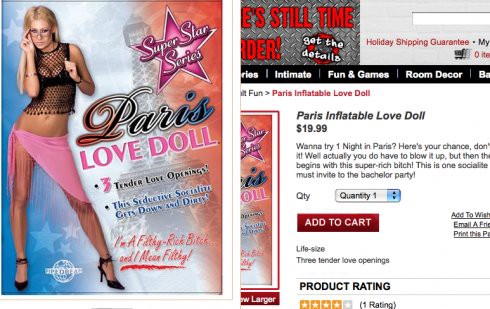

Ok. So what, right? Spencer’s brand of humor has always been less than classy.
Then there is this:
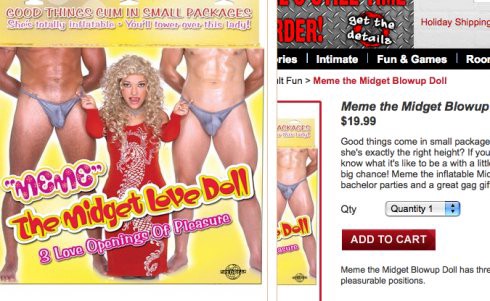
“MeMe” the Midget Blowup Doll: “Good things come in small packages, and did you notice she’s exactly the right height? If you’ve ever wanted to know what it’s like to be a with a little person, this is your big chance! Meme the inflatable Midget Doll is a hit at bachelor parties and a great gag gift for the birthday boy!”
Only $19.99!
This one raises even more questions. Why is she in an Asian-themed dress? Is she Asian? Why does Spencer’s even bother with the respectful “little people” when it’s already got “midget” in the title? Why aren’t there any customer reviews yet? And, how can Spencer’s justify selling this horrible thing?
To find out about that last question, I called Kevin Mahoney, Spencer’s general counsel. Mr. Mahoney is a busy man, dealing with everyone from the upset Irish to an an upset Willie Nelson to upset parent groups. He also handled Spencer’s 2008 Massachusetts child-labor violation.
Mahoney told me he was familiar with the product and that it was just one of Spencer’s offerings with “an adult theme.” When I asked how, even allowing for liberal interpretations of taste, he could justify the product, he insisted that the inflatable midget love doll is simply “a novelty and humor item.”
Mahoney added, “People’s senses of humor are subjective.”
Meanwhile, the reaction to “MeMe” I received from Gary Arnold, vice president of public relations for Little People of America, was predictable, surprisingly free of cursing, and very correct:
“For people of short stature, naming a toy a “midget doll” is equivalent to using the most insulting terms to identify an African American, Latino, Disabled, etc… doll.
In addition, most dolls marketed today that happen to be of a non-white ethnicity are not named according to the doll’s ethnicity. So if you create a doll that happens to be a person of short stature, why call it a “midget doll.” I can’t speak for the intentions of the doll’s creators, but I can speak to what I think is the impact of such a product. The doll will reinforce stereotypical social stigma against people of physical difference.”
So if you’re fighting your way through the mall this season and your gaze falls upon Spencer’s, maybe the emotion triggered will be a wistful nostalgia for the past and, then again, maybe it will be a more angry lament for a total loss of shame?
(N.B. The photo up top is a bunch of 13-year-olds on some school athletic team trip coming out of Spencer’s in a Fargo mall. Maybe one of them is your nephew, who just got himself a 3-love-openings-of-pleasure “MeMe” inflatable midget love doll.)
Abe Sauer sure loves Christmas shopping.
The Passage of the Senate Health Care Bill, 60-39
“The greatest and richest nation the world has ever known,” said Senator Harry Reid on the floor this morning, will now see an end of the dominance of the “greedy insurance companies.”
“This is just the beginning,” Reid said. “The opponents of this bill have used every trick in the book to delay this day.” (It was, by then, 7:03 a.m., and the vote was already itself just a bit delayed.) “It is regrettable that they choose to view our citizen’s healthcare through a political lens,” he said.
Then at 7:05 the roll was called. Senator Byrd coughed up that his “aye” vote was for Teddy Kennedy. Also, one was unable to tell from C-Span 2 exactly why the Senate cracked up for like 30 seconds when Reid voted, and no one was awake on the Internet to explain.
The Patient Protection and Affordable Care Act was, quite obviously, passed. You may go read it now, if you like.
